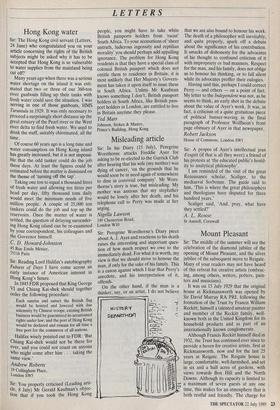Sir: Peregrine Worsthorne's Diary piece about A. J. Ayer and
reactions to his death raises the interesting and important ques- tion of how much respect we owe to the immediately dead. For what it is worth, my view is that we should strive to honour the man, if only for the sake of his family. This is a canon against which I fear that Perry's anecdote, and his interpretation of it, offends.
On the other hand, if the man is a thinker, say, or an artist I do not believe that we are also bound to honour his work. The death of a philosopher will inevitably, and quite properly, spark off a debate about the significance of his contribution. It smacks of dishonesty for the advocates of his thought to confound criticism of it with impropriety or bad manners. Respect for the man, and his family, does not oblige us to honour his thinking, or to fall silent while its advocates proffer their eulogies.
Having said this, perhaps I could correct Perry — and others — on a point of fact. My letter to the Independent was not, as he seems to think, an early shot in the debate about the value of Ayer's work. It was, in fact, a criticism of a quite gratuitous piece of political banner-waving in the final paragraph of Professor Wollheim's front page obituary of Ayer in that newspaper.
Robert Jackson
House of Commons, London SW1


















































 Previous page
Previous page